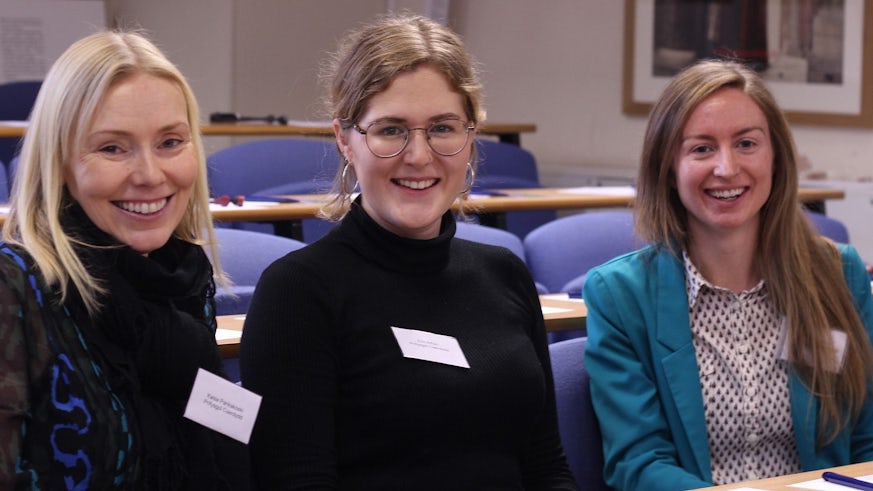Exploring multilingualism and multi-identities in Wales
19 December 2019

Cardiff University recently hosted a one-day conference exploring concepts of multilingualism and multi-identities in Wales.
The conference took place on Wednesday 6 December and attracted a diverse audience of researchers and practitioners, including academics, language teachers, policymakers and local government representatives. It was organised by three postgraduate researchers – Elin Arfon (School of Modern Languages), Eira Jepson (School of Modern Languages) and Kaisa Pankakoski (School of Welsh) – who are all engaged with language and linguistic-based research.
Elin Arfon explained why a multilingualism conference was needed: “We felt very strongly that more needed to be done to bridge the divide between bilingualism and multilingualism research in Wales and that there were opportunities for greater collaboration and mutual learning. Our aim was to showcase good practice, encourage networking and facilitate new ideas and new partnerships to look at languages in a more integrated way.”
It was a full and exciting programme of speakers and workshops which was opened by Professors Kate Griffiths and Dylan Foster Evans – Heads of the School of Modern Languages and the School of Welsh respectively. After a brief introduction by Elin, Eira and Kaisa on the day’s structure and aims, Professor Mererid Hopwood (University of Wales, Trinity Saint David), an award-winning author and former Children’s Poet Laureate of Wales, was welcomed as the first keynote speaker. Professor Hopwood’s address centred on multilingual learning in Wales and was followed by Dr Cassie Smith-Christmas from the National University of Ireland, Galway who asked What do we mean when we talk about ‘intergenerational language transmission’?
The third keynote speaker was Professor Tess Fitzpatrick from Swansea University who identified and explored the main obstacles and enables of multilingualism.
Other sessions during the day included:
- PGR/ECR panel: UK perspectives on multilingualism chaired by Dr Jonathan Morris from the School of Welsh with Tesni Galvin (Swansea University), Dr Anna Havinga (Bristol University) and Dr Lucy Rayfield (Exeter University)
- Workshop on the role of Higher Education: promoting bi-/multilingualism through outreach projects
- Workshop on multilingual literacy in schools: embracing multilingualism in the new curriculum
- Workshop on moving the field forward: methodological and analytical issues in Family Language Policy research
The final session of the day was chaired by Professor Claire Gorrara from the School of Modern Languages and was an opportunity to consider what next for multilingual and bilingual research in Wales. It sparked a lively debate about potential pathways, ideas and new initiatives to explore and develop, something Elin, Eira and Kaisa are keen to progress.
Eira Jepson reflected on the discussion: “We had excellent engagement throughout the day and the contributions on what we can do next have really given us food for thought. Some of the ideas which resonated most include hosting an international conference to share best practice across European countries, creating an accessible repository of multilingualism projects and developing increased opportunities for networking between academics and professionals.”
Kaisa Pankakoski added: “There’s a lot to consider but we are committed to harnessing the enthusiasm from the conference and facilitating opportunities for multilingualism researchers and practitioners in Wales to work together more closely. While it will take time for new initiatives to be progressed, we are already working on some exciting multilingualism projects currently and prime amongst these is the launch of a multilingualism research group in January 2020.”
See how the day unfolded by exploring the #MultilingualCymru hashtag on Twitter.
Share this story
Our research degrees give you the freedom to investigate a specific topic in real depth.


